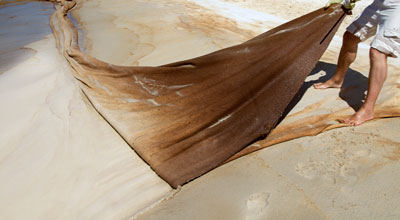| Jul 07, 2011 |
Nanotechnology against oil pollution
|
|
(Nanowerk News) The young company HeiQ helps with oil disasters. Fleece mats treated with a special impregnating technique can soak up huge amounts of oil and thus protect entire stretches of coast from contamination.
|
|
Barely a year has passed since one of the worst oil disasters in living memory off the coast of Mexico: the Deepwater Horizon oil rig went up in flames and hundreds of thousands of tons of crude oil spilled into the sea. Apart from causing devastating damage on the seabed and endangering marine life, various stretches of coast were also polluted by the oil spill.
|
 |
| The fleece protects the beach from contamination with oil. (Photo: HeiQ)
|
|
The tragedy prompted Swiss high-tech company HeiQ Materials to develop an oil-absorbing, hydrophobic chemical called "Oilguard". When treated with this impregnation technique, fleeces should protect the beaches hit by the catastrophe from oil pollution. The company had to move fast since its aim was to use these mats to help with the tragedy off the American coast. Only a month after the devastating disaster, HeiQ had already developed a prototype in collaboration with two other companies. Soon afterwards, its efficacy was demonstrated on a beach in the USA and in September 2010 Oilguard was classed as environmentally friendly by the American Environmental Protection Agency.
|
|
Oilguard – protection for beaches
|
|
The product is based on super-hydrophobic textile technology, although the exact production process remains a company secret. By impregnating it with the chemical, the material can absorb large amounts of oil within a short space of time. For instance, the fleece can soak up six times its own weight in oil and thus provides preventative protection for beaches and coasts during oil spills. Unlike with conventional products, such as containment booms or beach cleaning machines, the contamination of a beach can be prevented altogether. Moreover, Oilguard can be used on a large scale and installed quickly as needed. The five-and-a-half-metre-wide and up to one-hundred-metre-long fleece mats are also just ideal for cleaning beaches that have already been polluted. The oil-saturated mat is then disposed of in an oven for cement production.
|
|
Company with a bright future
|
|
HeiQ Materials was founded in 2004 as an ETH Zurich spin-off and initially made a name for itself in the textile industry. It has long been known that silver can counteract the reproduction of bacteria. The researchers at HeiQ found a way to insert tiny amounts of silver into an amorphous silicon dioxide matrix in such a way that the metal is finely dispersed and highly effective. The silver nanoparticles constantly give off positively charged ions, producing an antibacterial effect. This substance called "Pure" is mainly used in sportswear and hospital textiles. The silver substrate soon found buyers – in Europe, Australia, China and the USA. The small firm also markets another product called "Barrier" – an active agent that can prevent water, blood, oil and grease from penetrating textile surfaces. Apart from the textile industry, these products from the young company are also used in paints, lacquers and plastics.
|
|
"For us, innovation means fulfilling human needs with new, better and more sustainable products," says company founder Carlo Centonze. In doing so, they often draw inspiration from nature, including for the protective mechanism Barrier. Here, the company used the so-called "Lotus Effect". The lotus flower has little dirt-repellent nodules that enable the plant to clean itself on its own. The researchers also used this technique to develop Oilguard.
|
|
Numerous awards
|
|
The company name HeiQ stands for high quality and IQ – alluding to the production of "intelligent" material. That the quality of their products really is high is evidenced by the many prizes the young entrepreneurs have already won in their six years of existence. These include the Siska Heuberger Young Entrepreneur Prize, the Venture Leaders Award of the Gebert Rüf Stiftung, the special prize at the Venture competition in 2006 and the De Vigier Prize for Young Entrepreneurs. What's more, in 2010 they won the Swiss Technology Award with Oilguard in the Maturity Stage category, which is geared towards companies that already have products on the market and at the same time have managed to shine with a groundbreaking innovation.
|
|
(also read our Nanowerk Spotlight Nanotechnology-based solutions for oil spills on this topic)
|

